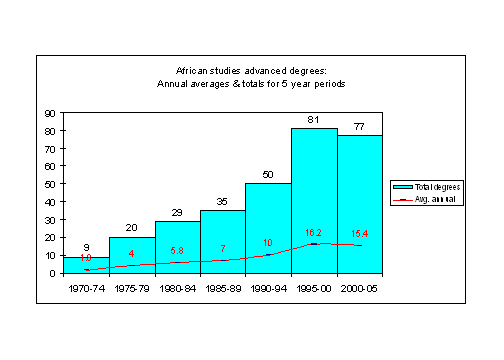completed at the University of Florida
| Note to all UF dissertation authors: Please sign and send us the author release form for digitization if you submitted in paper. |
| Permission form available at: https://www.uflib.ufl.edu/digital/procedures/copyright/retro_diss_scan/DDDCA.htm |
| 1995 | |||
| 1996 | |||
| 1997 | |||
| 1998 | 2010 |
||
| 1999 | |||
| 2000 |
With assistance from a succession of Graduate Assistants funded in part by the Center for African Studies, in 1996 I compiled the first comprehensive bibliography of African-related theses and dissertations completed at the University of Florida (originally through calendar year 1995, subsequently updated through 2000 and since supplemented with annual updates from 2001-2008). The source of the comprehensive bibliography is a searchable MS-Access database, while supplements are included without indexing or keywords. An NIH grant proposal is pending that may use the database to build ontologies and develop an automated tool (using the open source Lyra system developed by Dr. Howard Beck) to build a collection of African-related theses and dissertations on the fly during the calendar year 2010. More information will be forthcoming as this project develops. Until then, UF theses and dissertations updates for each calendar year are compiled during the following summer semester, primarily because catalog information and abstracts are not available until about six months following the December graduation.
Documentation for African universities' dissertations and other dissertations relating to Africa has improved in the nearly fifteen years since our local project began. Several US-based compilers have worked to highlight their own institutions' research, and several broader lists of thesis and dissertation related resources such as that compiled by Karen Fung (who manages the Africa South of the Sahara site at Stanford University) and Peter Limb (who maintains A-Z of African Studies on the Internet at Michigan State University) are available. Note that the Center for Research Libraries catalog allows an advanced keyword search to limit searches to CAMP monographs, newspapers, serials and (foreign) dissertations. All dissertation records in the CRL catalog are now available in OCLC's FirstSearch (WorldCat is available on the library web site's Quick Links or Research Gateway, or use use WorldCat.org if you aren't affiliated with UF).
This project makes evident the remarkable growth of African related graduate degrees in the 1990s and 2000s. This growth impacts upon the libraries as graduate students seek access to materials important to their research projects and writing. In the 1980s the libraries were supporting about six or seven advanced degrees per year on African topics. In the first half of the 1990s we supported ten advanced degrees per year, a figure which grew to more than fifteen per year (on average) from 1995and has continued for a decade. The chart below illustrates this pattern of growth quite well (despite my unintential error of including the year 2000 in both of the last two periods--it's still on my "to-do" list):

During the years 1956-99, total master's level degrees (including M.A., M.A.J.C., M.A.M.C., M.A.U.R.P., M.Arch., M.Eng., M.F.A., M.S. and M.S.B.C.) number 125. One hundred and six (106) doctoral degrees (Ed. D., Ph.D.) were awarded for African-related work (as determined by my analysis of thesis and dissertation abstracts) during this time. Total advanced degrees awarded during this period number 231.
Note that many master's degrees are awarded without a thesis component, so we essentially have no way of tracking these.
|
Masters degrees |
125 |
|
Doctoral degrees |
106 |
|
Total adv. degrees for period |
231 |
The 1956 start date was simply based on the earliest thesis I could identify in the Library Catalog that had a significant African component. In fact, the program only took off much later. For the arbitrary 12 year period 1988-99, 71 MAs and 80 PhDs were awarded, for a total of 151 (65% of total degrees awarded since 1956 were granted in the last 12 years, accounting for 57% of the total number of masters and 75% of doctoral degrees awarded). This again supports other indications that the program has grown phenomenally in the 1990s.
The distribution of advanced degree-granting departments is also remarkable, with a notable growth of professional school theses in the past ten years (the arts are among the "other" departments included in this category, too). Most important, however, is the fact that overall, degrees relating to natural resources and their conservation in the African context have become as numerous as degrees in the social sciences (traditionally the dominant disciplinary focus of African Studies at UF). Social science departments remain most productive at the Ph.D. level, while professional school Master's degrees have become more significant in the latest five-year period.
 |
 |
 |
 |
Please contact Dan Reboussin danrebo@ufl.edu if you wish to comment on this project, make corrections, or have suggestions for additional inclusions in the database.

